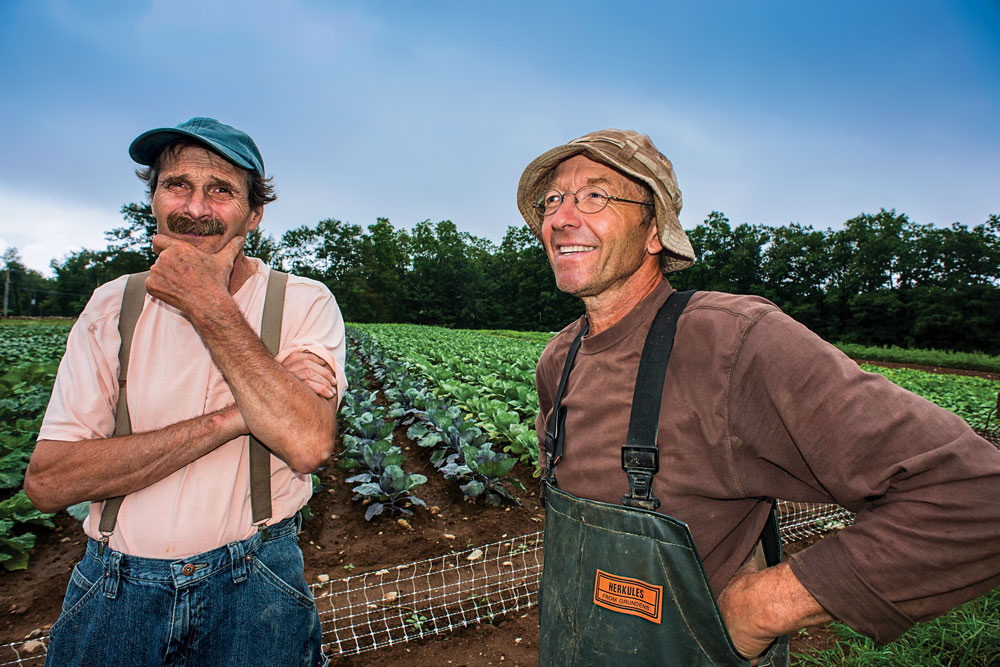
The story of Temple-Wilton Community Farm is one of community and commitment, persistence and vision. As a community-based farm, Temple-Wilton provides support for its farmers and food security for its members. The farm exemplifies how Agrarian Trust might protect a working farm in perpetuity as a kind of ‘agrarian commons’ while upholding the values of access, affordability, and land security.
The Temple-Wilton Community Farm is located atop Abbot Hill, in southern New Hampshire in the town of Wilton. It was founded in 1986 and holds the distinction of being home to the oldest continuously operating community-supported agriculture farm, or CSA, in the United States. The highly diversified farm ranges over more than 200 acres and produces biodynamically grown vegetables and pasture-raised livestock as well as raw milk and cheeses. But, as its founders point out, a large part of what makes Temple-Wilton such a remarkable place is its organizational structure, a unique collaboration that has evolved over the course of thirty years, culminating in a complex set of relationships that sustains the land, the farm, and the community. In their own words:
“What really makes our farm special is our organizational form that has enabled us to separate the food produced from the finances needed to operate the farm. This is based on our strong community of respect and trust.”
Early History & Vision: Mutual Support from Interdependence
Anthony Graham, Lincoln Geiger, and Trauger Groh met through the community of the High Mowing and Pine Hill Waldorf Schools. Early on, they decided to begin collaboratively farming on leased and borrowed land. The farmers developed “principles of cooperation” to guide their work, including how operational costs would be shared and how budgets would be approved. In 1986, they articulated their overarching vision and collaborative arrangement in their “Aims and Intentions.” They would be guided by collectively agreed upon “spiritual and nutritional aims, rather than by our financial needs.” With this bold, holistic vision for a healthy farm and an interdependent farm community, the farmers also included as their legal aims: “to make access to farmland available for as many people as possible through the use of covenants and easements that protect the land from development in perpetuity [and] to create forms of cooperation that allow us to separate the financial needs of the active farmers and of the farm from the economic value of the food.”
Anthony, Lincoln, and Trauger were first-generation immigrants, each coming from different countries with a variety of land tenure and community farm models to draw on. Hailing from Zimbabwe (Anthony), Sweden (Lincoln), and Germany (Trauger), they each brought unique experiences with land and farming to a new landscape. They started Temple-Wilton just as the modern land conservation movement was taking off in America. As Groh later wrote in Farms of Tomorrow Revisited: Community-Supported Farms, Farm Supported Communities, “that farms flourish must be the concern of everyone, not just the individuals working as farmers.” The farmers’ vision was for the community to support the whole farm as long-term partners in its operation. In turn, the farm could reciprocate and support the community from the bounty of the land. The founding farmers worked with members of their community and Robyn Van En of Indian Line Farm, as well as that farm’s community, to contribute to developing the farm model that we now know as the CSA. Today, the farm defines itself as “a free association of individuals, which aims to provide life-giving food for the local community and to respect the natural environment.”
The farmers thus set the stage for their farm practices. Financial gain was not the primary motivation of the first generation of farmers, yet the farm would become a financially sustainable model through the backing of a large community of committed CSA members, and ultimately, a member-owned cooperative including farmers and member households.
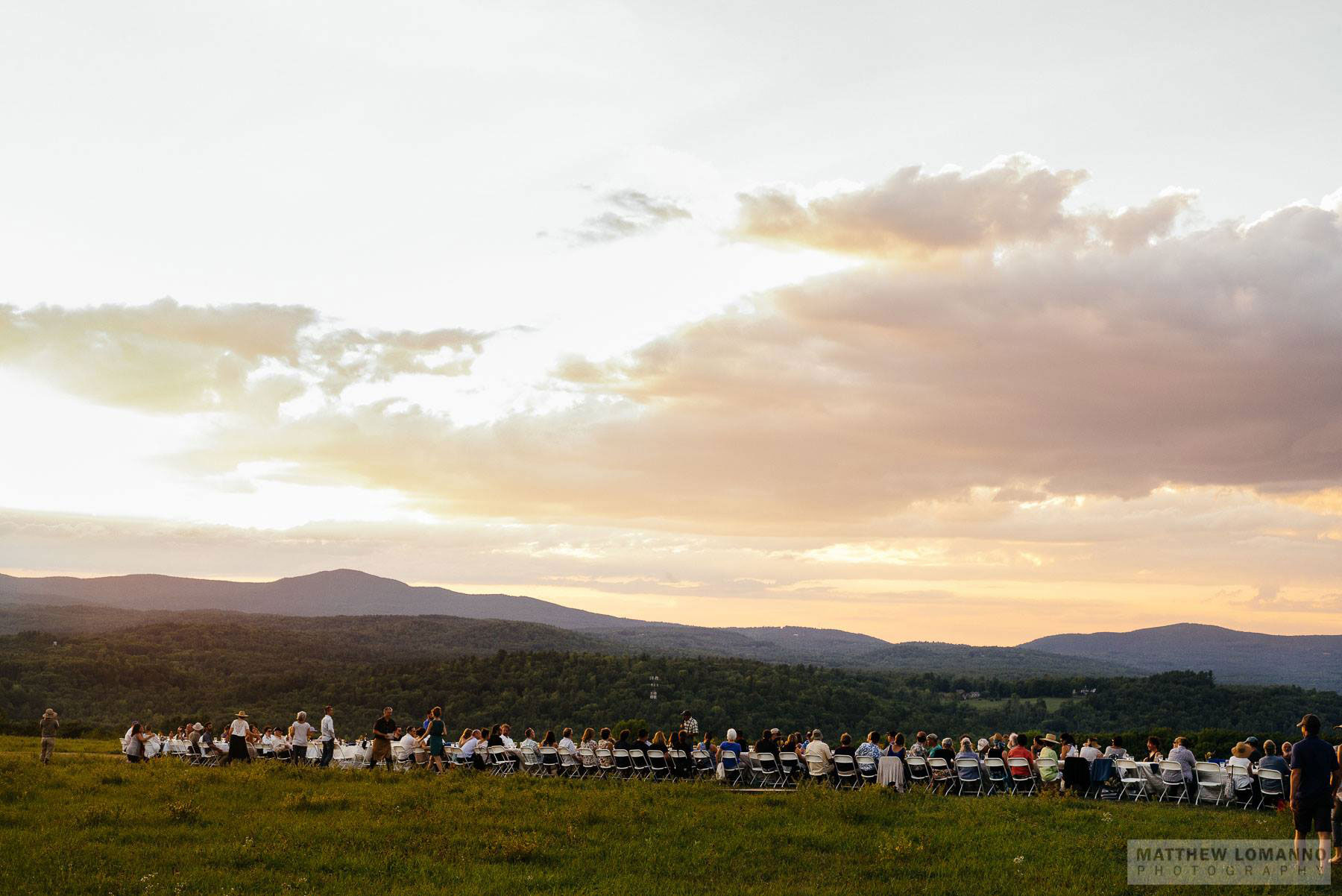
A CSA Model to Increase Food Access & Equity
Most CSAs operate by selling defined shares of a farm’s harvest at a fixed cost, often in the months before the start of the following season. This upfront investment provides farmers with capital when it is needed and establishes a level of shared risk. At Temple-Wilton, the farmers and community members work together to draft a complete farm budget for its operation each year. The budget is notable in that it includes nearly all operational costs, such as farmer compensation, capital improvements, and goes beyond simply accounting for the cost of production for food produced for the CSA. However, capital improvements are not always fully included in the budget. The community is able to contribute some funds toward capital expenditures but still often has to rely on fundraising, especially for larger projects.
The farmers present this budget to the CSA members at an annual pledge meeting and ask the members to collectively raise the funds needed. Those who can afford to pay more generally do so, allowing others who aren’t able to pay the baseline amount to pay less and continue to share in the harvest. Members are then able to pick up produce at the farm store in amounts and at times that they desire. The farm store serves in the place of a predetermined CSA box and includes fresh, unprocessed foods for members to choose from as well as processed goods for sale. Barring limited supplies, the ‘shares’ members enjoy aren’t predetermined but are rather based on what members need and desire each week.
In taking this approach, the farm has basically inverted the more common CSA model, in which the financial relationship between the community and farm is limited. At Temple-Wilton, the community essentially ‘hires’ the farmers by covering the cost of the farm’s budget each year. Instead of the farmers working to find customers to buy a portion of the harvest in the form of CSA shares, the community backs the farmers’ efforts from the start.
Building enough community support for this model to work has taken many years. The farmers struggled at first to gain enough support to cover their costs. But now as the second generation of farmers takes its place, the original focus on community appears to have yielded steadfast support for the farm’s future. Soraya Farivar, a recent farm intern, shares: “There is something deeper happening and I think that stems from years of community support… The security of the land depends whole-heartedly on the support of the community. If every farm only had members like Temple-Wilton!”
Producers and consumers sharing the same table can result in a more equitable and stable arrangement for the farmers and greater food security for the community. Since the entire membership is responsible for raising the budget for the year through collective contributions, the farmers don’t have to pick and choose who can have access to the farm store. It’s not based on an individual’s ability to pay, but on the community’s as a whole. As the farm’s website explains:
“Having made a contribution, the member is free to take as much food as is needed, depending on availability. Processed goods such as yogurt, cheese, meat, bread, eggs, etc., are sold at a price that will enable the processing costs to be covered as well as creating a fund to cover costs that are not met by the member pledges.”
The farm abides by an ethic that seeks to decouple the value of food from its monetary cost. In effect, the farm’s practices work to disentangle the cost of food production from its ultimate value to human and environmental health. Growing an acre of tomatoes isn’t looked at as an “enterprise budget” and an issue of net profit per acre. It’s foremost about growing a delicious, nutrient-dense tomato and building the soil that will keep growing good tomatoes. It’s not purely about achieving a specific cost of production.
“That’s the beauty of Temple-Wilton Community Farm—as the farmer there is no breaking your back to reach out to others and market your produce. You are completely separated from the marketing aspect, and have an influx of beautiful people who appreciate your hard work and come to support the farm, and therefore support the community.”
– Soraya Farivar, former Farm Intern at TWCF, Greenhorns Staff
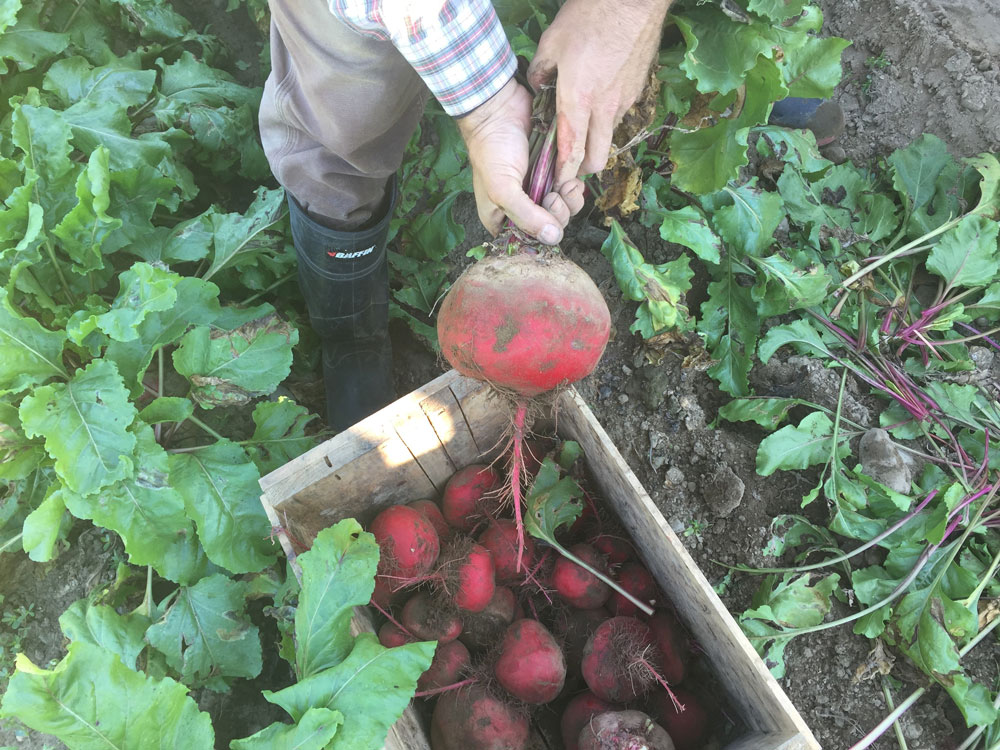
Land Access Challenges & Creative Partnerships
Despite being the oldest continuously-operating CSA in the U.S., the farmers struggled for almost 28 years to achieve land security. At first, Anthony, Lincoln, and Trauger farmed on a patchwork of leased and informally borrowed land throughout the community. The farmers had no stable tenure year-to-year, and often saw a lot of their effort wasted—having to start on new ground each year or having to travel miles from field to field.
In the late 1990s, the farmers and several CSA members formed a New Hampshire nonprofit called the Educational Community Farm. This nonprofit, the farmers themselves, and the farm were then able to acquire the most important leased land and then use conservation easements to protect the land, using the proceeds to pay off the mortgage debt on land. The USDA’s Natural Resources Conservation Service (NRCS), Town of Wilton, New Hampshire Land and Community Heritage Investment Program, NH Department of Environmental Services, the Russell Foundation, Yggdrasil Land Foundation, and community fundraising all supported these multiple land transactions.
In 2002, four CSA member families purchased 40 acres and formed an LLC to collectively own and hold title to the property. The farm members paid back the LLC through a sale of a conservation easement partially funded through NRCS, NH Land & Community Heritage Investment Program grant, and the sale of the property to the Yggdrasil Land Foundation, a land trust that supports biodynamic farming. All this complicated work took place without interrupting farm activity, and it established a 99-year, rolling lease for the farmers.
During the 2000s, two of the farmers, Lincoln and Anthony, were able to purchase smaller acreage parcels of farmland integral to the operations and place the land under a conservation easement (funded by the Town of Wilton, the state of New Hampshire, NRCS, Russell Foundation, and community donors). In 2014, as part of related land acquisition and conservation work with neighboring High Mowing School, Ian McSweeney (now director of Agrarian Trust) engaged Yggdrasil Land Foundation. Anthony and Lincoln donated farmland to Yggdrasil, and Yggdrasil accepted, providing a 99-year lease to the Educational Community Farm for the farmers.
Towards Secure Tenure: Developing a Community-Supported Land Tenure Model
During this same time, there was a tenuous land access issue between the farmers and a development company, Senator Development, LLC, which owned 68 acres and the historic Four Corners Farm that functioned as the farmstead’s center of operations. To ensure stable tenure and that the land would be kept as farmland, the Educational Community Farm (the nonprofit) raised funds to support the Town of Wilton’s acquisition of a conservation easement on the 68 acres and a preservation easement on the farmstead buildings. In exchange, The Educational Community Farm obtained a 99-year lease for the Temple-Wilton farmers. While the 99-year lease was helpful for stable tenure, it did not provide equity for the farmers for investments, responsibilities to the landlord, or security against landlord termination. Instead, the value of all improvements went to the landlord, and the landlord was not responsible to make basic improvements.
Lack of equity, health and safety issues, and lease longevity concerned the Temple-Wilton farmers. The farmers were in a bind; Four Corners Farm had failing well and septic systems and crumbling buildings, and the lease did not require the landlord to fix these issues, nor did the lease give the farmers equity if they fixed them. Finally, in 2015, the farmers, Ian McSweeney, and community leaders developed a project, reached agreements, and launched a campaign that would ensure the land’s availability for future generations of farmers. The diversified fundraising campaign was in effect a “community supported land tenure” model of fundraising, as Ian calls it. The campaign raised $576,000, comprised of 340 donations, 2 grants from the New Hampshire Charitable Foundation, and 24 individual loans, which were aggregated and managed by the NH Community Loan Fund.
“For CSA farms that exist, there are opportunities to deepen the relationship thanks to a built-in audience and community. Raising over $500,000 was very powerful, and other CSAs could accomplish similar ‘Community Supported Land Ownership’ work, too.”
– Ian McSweeney, Organizational Director at Agrarian Trust, and formerly of Russell Farm and Forest Conservation Foundation that spearheaded the long-term, stable land tenure work that led to ownership of the farmstead at the heart of TWCF’s operations
Currently, Yggdrasil and the nonprofit Educational Community farm have one written lease for the various farm properties donated to Yggdrasil. This lease is important in that it allows farmers to build equity—only the land is leased, and the Educational Community Farm owns the buildings, structures, and other improvements. Of equal importance is the rent amount. Instead of fair market rent, the lease ensures Yggdrasil’s costs are covered. To achieve this, the Educational Community Farm covers costs related to taxes, maintenance, and operating charges; covers Yggdrasil’s “stewardship” costs to oversee the land and lease; and pays a nominal $1/year rental fee. This ground lease is also rolling and automatically renews every 99 years for an extension of another 99 years.
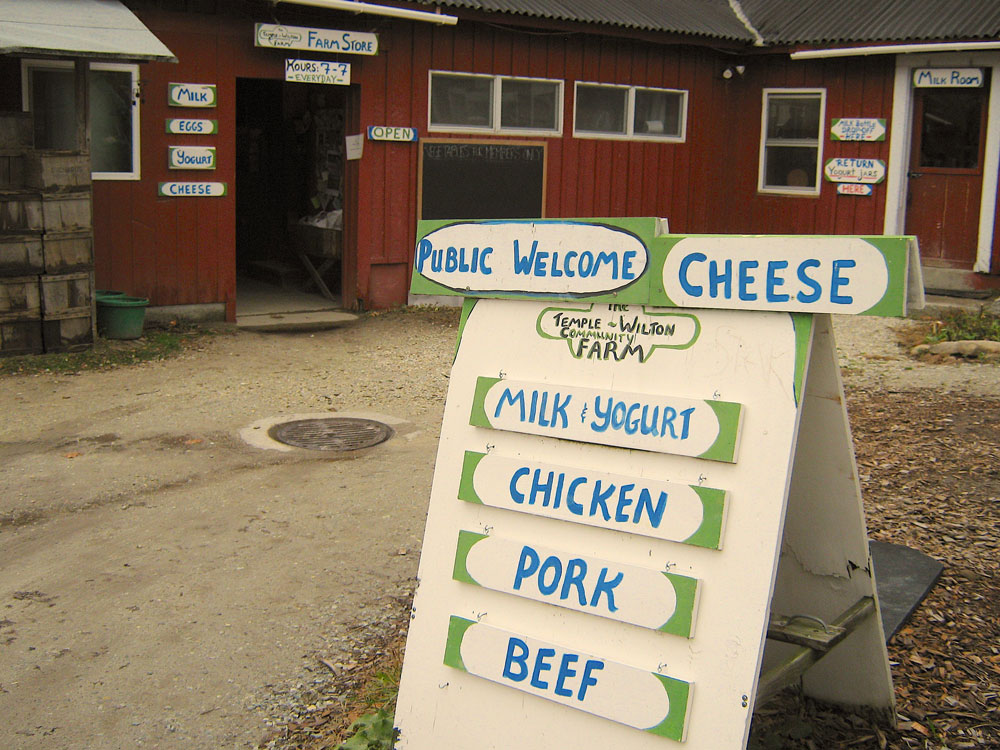
Enterprise Diversification & Continued Community Support
In 2011, Hilltop Cafe opened as a farm-to-table restaurant, which brings in non-farm revenue and a diversity of customers who bring energy and interest in the farm, often then visiting the farm store. Lease revenue from the cafe goes to the Educational Community Farm nonprofit, which significantly supports TWCF’s mortgage debt. Hilltop Cafe also serves as a community gathering space. Two local schools that have been integral to the farm community since its beginning, Pine Hill and High Mowing, mutually benefit with the Cafe’s success.
In 2016, the farmers and CSA members formed a member-owned cooperative called Four Corners Cooperative, which does business as “Temple-Wilton Community Farm.” The purpose: “The Farm is dedicated to providing biodynamically grown food for the local community while building and maintaining the fertility and life diversity necessary for a self-sustaining farm organism on the lands entrusted to it. The Farm shall retain all net surplus for re-investment in the stewardship and further development of the farm organism. Individual profit from farming is not an economic aim of the Farm. Our guiding principles in this effort derive from the Aims and Intentions originally set forth by our founding farmers.”
In essence, the cooperative was formed as a way to clarify what was considered community property and manage the founders’ exit. It aims to provide security and support for the next generation of farmers. Since most people don’t actually farm for 99 years, it’s good news for the farmers (and their backs) that the cooperative is also working on starting a formal retirement fund for them.
Over the years, Trauger’s own small farm, Groh Farm (privately owned by Trauger and Alice Groh) has been made available to the TWCF operations when needed. Alice says that it may soon be looking for its next generation farmer as well.
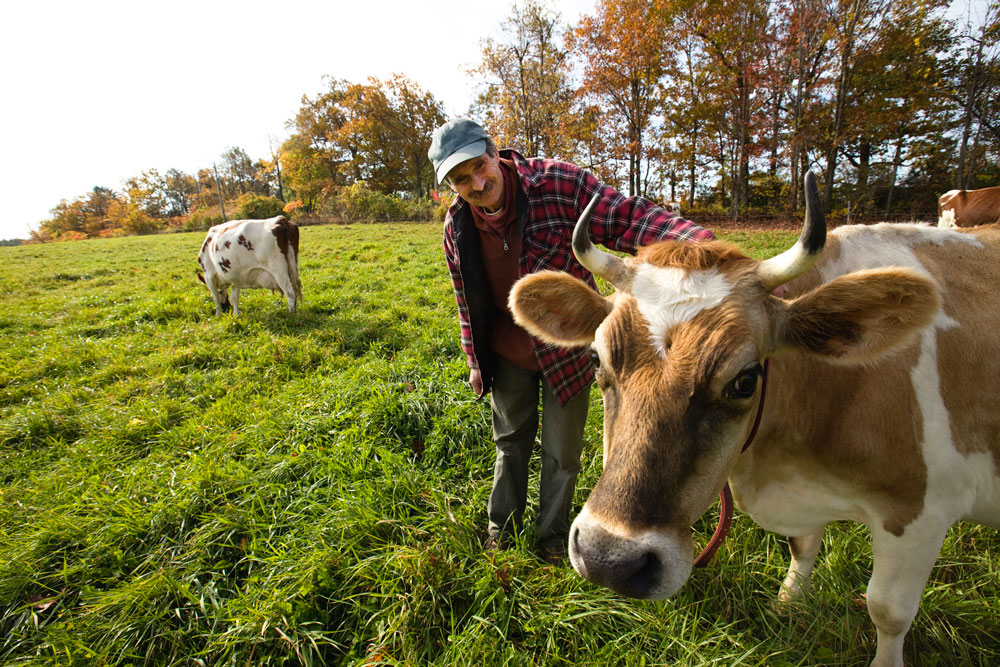
Current Learning
Challenges continue, as can be expected in evolving tenure and ownership situations that revolve around farming, community food systems, and food access. While TWCF has achieved land ownership, the founding farmers’ issues have shifted to equity and retirement.
Meanwhile, beginning farmers are working to secure adequate housing on the farm. TWCF set aside land at Four Corners to build a duplex for farmers, as the conservation easement set aside land for future farmer housing, but impediments have arisen around achieving this goal. The primary problem is that the land set aside for housing is not easily utilized based on the costs and approvals needed to develop the site.
For two decades, the founding farmers did most of the farm and land access work with little more than the support of their community and its goodwill. It was not until the last decade that they employed nonprofits, foundations, and government tools to assist with land tenure and conservation. With outside help, the resolution of conservation and land access issues can often be accelerated. As the farmers have shared, some solutions don’t involve owning land. Instead, if a land trust holds and protects the land, there is no chance of it being sold for development. Decommodifying the land is better for the community and the environment, and it provides a foundation for creative land access and stable tenure arrangements for beginning farmers in the context of a community farming model.
At Agrarian Trust, we have firsthand experience innovating the community supported land tenure model at Temple-Wilton Community Farm, spearheaded by Ian McSweeney, our director. Temple-Wilton’s model embodies the CSA ethic in a land ownership context. It also aligns with our vision for an agrarian commons in that it:
– Targets already conserved farmland that also addresses farm security, healthy farm practices, community engagement, and food access
– Develops an online platform for fundraising and builds a social media presence
– Leverages strong community support, encouraging community members to engage more deeply with fundraising
– Raised diversified funds, including foundation support and individual investments
– Allows a community nonprofit to own the farm and ensure land tenure, food access, and farm viability for current and future farmers.


